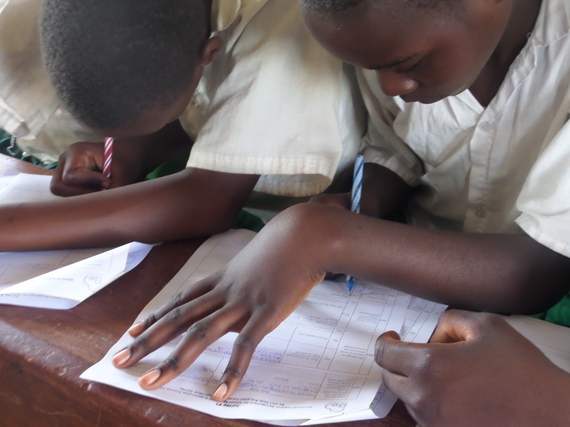In order to solve global problems holistically we have to make sure we are asking the right questions. When it comes to the question of equality of gender, we first have to ask ourselves what we mean by equality? Is it defined as it is in the UN Declaration of Human Rights? Does it mean fair treatment, equal wages or civil participation? Is there access to schooling? What must we consider in order to define equality? In the interest of having a culturally unbiased definition for it, let's say for the sake of this argument that equality means equivalent degrees of freedom; that is to say that equality is really about unimpaired access to opportunity and individual choice. However, we must bear in mind that due to global income inequality, this means different things for different populations and, in particular, for women at the global and local scale.
Achieving equality amongst humanity is not only a moving target as global population and resource use patterns change over time, but, I will argue, it is also a matter of changing our perspective. What does equality mean in an age where 5 percent of the global population uses 20 percent of the energy as is the casein the US? In fact, it is now estimated that we would need over 4 Earth's to provide every human the standard of living of the average American, over 2 Earth's for the French standard, and even over 2 Earth's if everyone lived like the average Costa Rican.
So what do we mean by equality in this context? Resolving this paradox at the core of global development is perhaps too great of a question to aspire to answer, but it is the backdrop against which it becomes appallingly clear that inequalities in the world, gender inequality, specifically, continues to be one of the most prevalent issues across societies of all cultures, locations, beliefs and income levels.
It is important to contextualize the notion of equality of opportunity and choice as it relates to gender dynamics. Women are overall underinvested in, underserved, underrepresented and often deliberately hampered by externally imposed barriers, that is, in relation to their average male counterpart. For example, although there are more female university graduates than men in the USA, women continue to be proportionately underrepresented and underpaid in the workforce. This disparity is materially wider in less developed and resource constrained environments. So yes, what I mean by gender equality is having just as many opportunities available as possible and the choice to take them on; the choice to try something new, the chance to fail, and to get up and try again.
Will this challenge many deeply rooted cultural rites, beliefs, and roles for women in society? Will this shake many communities at their foundation? Yes, absolutely.
Why? Other than because it's right? If we just consider it through the lens of the principles that all UN Charter signatories uphold as their common stance, it is unjustifiable to argue against it. Anyone that can take the position that women should be subjected to different rules, treatment and standards than men, I believe to be on the wrong side of history. For humanity's sake, I hope I am right.
How many cultural rites, gender roles and inequality practices would crumble and disappear if they were not imposed by men onto women? However, should we be able to bring about a global shift in attitudes towards women by men, it still is not the equality panacea. Often it is women who impose many limitations on other women and girls including female genital mutilation (FGM) and myths about menstruation or other sexual, reproductive and gender health related subjects. Ultimately it's not only about men's responsibility to rectify the gender imbalance, breaking the barriers requires women as well. I am confident that women can show men the way towards real gender equality.
Moreover, clearly establishing the importance of equality within gender as a way to support gender equality is a priority for my good friend and Be Girl Co-Founder Diana Sierra and me in everything that we do. When we create a design, we aim to create universal products to minimize the financial and environmental footprint while providing autonomy, performance and satisfaction to the user. We think of all the use applications and design requirements so that quality products are accessible to as many girls in need in places like South America, Africa and the Middle East, as they are to girls in New York City, London or Paris. We call it design for womankind!
As a man working in the space of Menstrual Hygiene Management (MHM) I understand how someone, male or female, may feel there is little they can do in their day to day life for women beyond educating oneself, being empathetic, helpful and considerate, with regards to the natural experiences women confront. However, there is much more we can do to empower women globally and steadily march towards true equality.
For some the imbalance is clear and understood, but not to everyone. That is why the issue remains unsolved. Others are less impassioned and seek an objective and logical reason to support gender equality, however there are a plethora of empirically demonstrated studies that support that investments in women yield positive societal returns for everyone. Investing in a girl's education is investing in the future, achieving better household outcomes, improved family health, a commitment to education, and increased income opportunities. But you don't need to spend any money necessarily, just engaging with the topic is a step in the right direction. Ask yourself, what can you do for gender equality today? Perhaps it might be as simple as asking the right questions.
Image Copyright: Be Girl, Inc.

